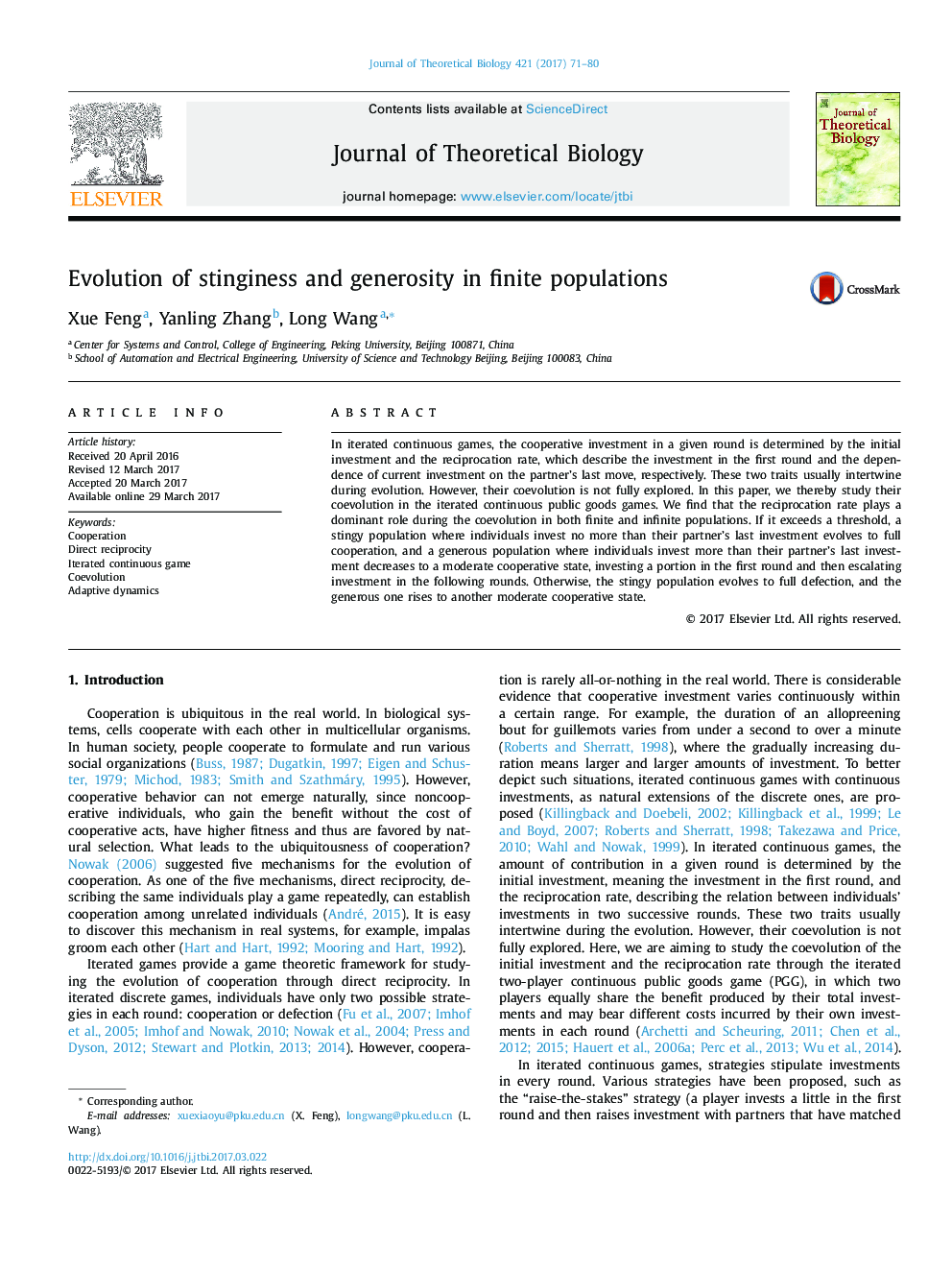| کد مقاله | کد نشریه | سال انتشار | مقاله انگلیسی | نسخه تمام متن |
|---|---|---|---|---|
| 5760021 | 1623789 | 2017 | 10 صفحه PDF | دانلود رایگان |
عنوان انگلیسی مقاله ISI
Evolution of stinginess and generosity in finite populations
ترجمه فارسی عنوان
تکامل خستگی و سخاوت در جمعیت های محدود
دانلود مقاله + سفارش ترجمه
دانلود مقاله ISI انگلیسی
رایگان برای ایرانیان
کلمات کلیدی
ترجمه چکیده
در بازی های پی در پی تکرار شده، سرمایه گذاری تعاونی در یک دور مشخص با سرمایه گذاری اولیه و نرخ تقطیر تعیین می شود که سرمایه گذاری در دور اول را نشان می دهد و وابستگی سرمایه گذاری فعلی به ترتیب آخرین حرکت شریک است. این دو ویژگی معمولا در طول تکامل درهم تنیده می شوند. با این حال، تکامل آنها به طور کامل مورد کاوش نیست. در این مقاله، ما به این ترتیب، هم جواری آنها را در بازیهای جامع عمومی بازرگانی تکرار می کنیم. ما متوجه می شویم که میزان تلاطم در طول تکامل در هر دو جمعیت کم و بی نهایت نقش مهمی ایفا می کند. اگر بیش از یک آستانه، یک جمعیت خجالتی که افراد بدون سرمایه بیشتر از آخرین سرمایه گذاری شریک زندگی خود، به همکاری کامل ادامه دهند و یک جمعیت سخاوتمند که در آن افراد بیشتر سرمایه گذاری می کنند، از سرمایه گذارانی که اخیرا سرمایه گذاری می کنند، به یک کشور تعاونی معتدل کاهش می یابد، سرمایه گذاری بخش در اولین دور و سپس افزایش سرمایه گذاری در دورهای بعدی. در غیر این صورت، جمعیت خمیده به نقض کامل تبدیل می شود و یکی از سخاوتمندانه ها به یک دولت تعاونی معتدل می رسد.
موضوعات مرتبط
علوم زیستی و بیوفناوری
علوم کشاورزی و بیولوژیک
علوم کشاورزی و بیولوژیک (عمومی)
چکیده انگلیسی
In iterated continuous games, the cooperative investment in a given round is determined by the initial investment and the reciprocation rate, which describe the investment in the first round and the dependence of current investment on the partner's last move, respectively. These two traits usually intertwine during evolution. However, their coevolution is not fully explored. In this paper, we thereby study their coevolution in the iterated continuous public goods games. We find that the reciprocation rate plays a dominant role during the coevolution in both finite and infinite populations. If it exceeds a threshold, a stingy population where individuals invest no more than their partner's last investment evolves to full cooperation, and a generous population where individuals invest more than their partner's last investment decreases to a moderate cooperative state, investing a portion in the first round and then escalating investment in the following rounds. Otherwise, the stingy population evolves to full defection, and the generous one rises to another moderate cooperative state.
ناشر
Database: Elsevier - ScienceDirect (ساینس دایرکت)
Journal: Journal of Theoretical Biology - Volume 421, 21 May 2017, Pages 71-80
Journal: Journal of Theoretical Biology - Volume 421, 21 May 2017, Pages 71-80
نویسندگان
Xue Feng, Yanling Zhang, Long Wang,
